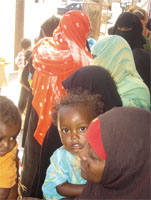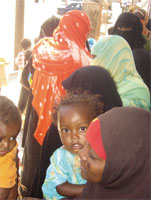
Al-Basateen’s residents: We are not afraid any more of HIV test [Archives:2008/1138/Health]
March 17 2008
 |
HIV is a problem in Al-Basatin, a neighborhood in Aden governorate where many Somali refugees settle. While controlling the disease's spread becomes more difficult every day due to the thousands of new refugees flooding in, there are also positive developments in the neighborhood's fight against HIV/AIDS.
For example, a year-old awareness campaign promoting awareness and condom usage and a newer drive to provide free blood tests has been successful, according to its organizers.
Last year, Al-Basatin received approximately 12,000 Somali refugee families, each with approximately eight children, and new refugees continue pouring into the neighborhood because family or friends from the existing Somali community already live there.
Already this year, the number of refugees in the area has increased to 15,000 families, according to Nidhal Bahoeireth, head secretary of the Charitable Society for Social Welfare's Aden branch.
Organizations like UNHCR and the Charitable Society for Social Welfare, a private charity, are working together to better help the refugees turn the tide against HIV/AIDS in their community. Last year, the two organizations gave YR 3.8 million to support the awareness campaign.
The Center for Childhood and Motherhood, which provides medical care for children and pregnant mothers, recently debuted a special HIV/AIDS awareness campaign targeting Al-Basatin's 18- to 25-year-old age group. According to Bahoeireth, HIV among Somalis is on the rise and has spread rapidly throughout the community within the past five years.
According to Dr. Insaaf Al-Qadassi, deputy manager of Aden's Charitable Society for Social Welfare, HIV has increased among Somali refugees because many of them are unaware of the risk and hesitant to take blood tests. While residents of Al-Basatin are free to decide whether to be tested, the awareness campaign encourages it and reinforces its importance.
Al-Basatin's HIV/AIDS awareness campaign has been going on since last year and the results so far have been promising, Al-Qadassi says. The number of HIV/AIDS cases in Al-Basatin – and indeed in all of Yemen – is an official secret, with authorities believing that HIV/AIDS patients will face discrimination if the number is revealed.
Likewise, Al-Basatin's health center often hesitates to disclose to patients that they have tested positive.
“At first, we don't tell them they have HIV because they'll run away and not return because they're afraid,” explains Mohammed Abdullah Al-Sheginah, source manager at Aden's Charitable Society for Social Welfare.
For those who do know their condition, he stressed that the center reassures them that the disease isn't terribly dangerous and that there's no need to be afraid. “They just need to be careful and not have sex with HIV-negative people and never make blood transfusions.”
“We also recommend that unmarried people use condoms when having sex,” Al-Sheginah noted, adding, “Although it's forbidden, whether we like it or not, they will have sex, so it's best to direct them in the right way.”
HIV-positive Somali refugees aren't relocated elsewhere, such as Al-Kharaz Camp; rather, they remain integrated with the rest of Al-Basatin's population. “Those with HIV aren't neglected or ignored and we don't separate them from others,” Al-Qadassi noted, “Instead, we teach them how to live and deal in their community. It has taken time, but many now are living in their community without any problems.”
Just last month, six people in Al-Basatin area died of complications from the AIDS virus. While there have been several AIDS-related deaths in the past five years, neither the Charitable Society for Social Welfare, UNHCR nor the Yemeni government will release any figures for fear of creating widespread panic among the general population, including HIV carriers themselves, Bahoeireth explained. However, he estimates the number of HIV/AIDS cases in Al-Basatin at around 1 to 3 percent of the area's population.
The awareness campaign has made Somali refugees in Al-Basatin aware of HIV's risks, but most significantly, more are coming to the health center for blood tests, Bahoeireth pointed out, as residents previously were hesitant – if not outright afraid – of taking an HIV test.
Besides the HIV/AIDS awareness program, UNHCR also assists the Charitable Society for Social Welfare in providing Al-Basatin's health center with free vaccines and medicine to combat malaria and tuberculosis.
——
[archive-e:1138-v:18-y:2008-d:2008-03-17-p:health]


